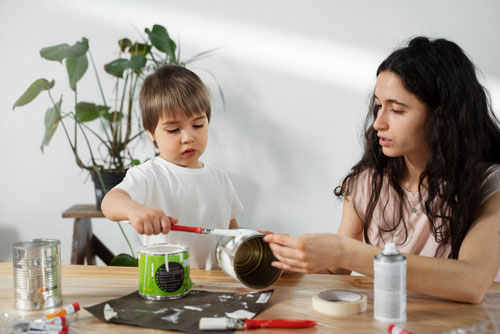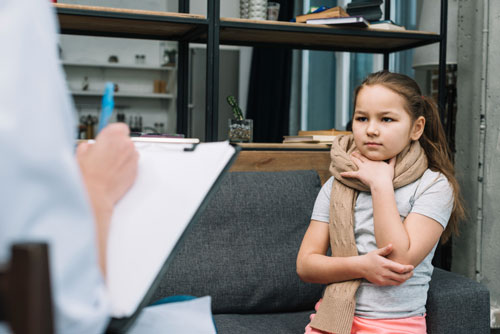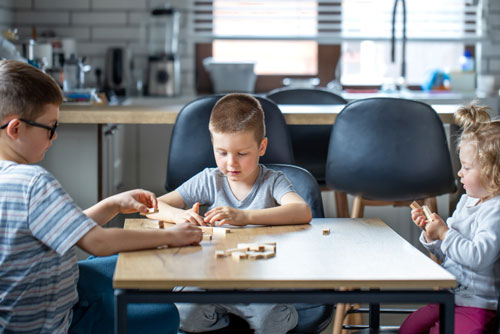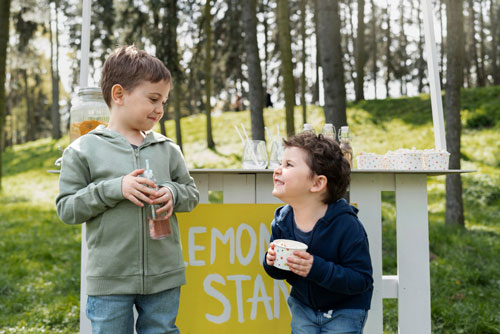Parenting a child with social anxiety can be a challenging journey. Watching your child struggle with social interactions can be distressing. However, there are effective coping strategies that can help both you and your child navigate through this difficulty. In this article, we will explore some practical coping strategies to support your child through their social anxiety.

Understanding Social Anxiety in Children
Social anxiety in children is a common psychological issue that can significantly impact their emotional well-being and daily functioning. Understanding the complexities of this condition is vital for parents and caregivers to provide the necessary support and guidance. Here are some key insights to help you comprehend social anxiety in children better:
Early Signs and Symptoms
Children experiencing social anxiety often exhibit specific behavioral patterns. These can include excessive shyness, avoidance of social interactions, reluctance to participate in group activities, fear of being embarrassed, or extreme self-consciousness in social settings. Recognizing these early signs is crucial for early intervention and support.
Impact on Daily Life
Social anxiety can significantly affect various aspects of a child’s life, including academic performance, social relationships, and overall emotional well-being. It may lead to school avoidance, difficulty making friends, or a lack of participation in extracurricular activities. Understanding the potential impact on different areas of a child’s life can help parents address the challenges effectively.
Triggers and Stressors
Identifying specific triggers and stressors that exacerbate social anxiety in children is essential. These triggers can vary from one child to another and might include situations such as public speaking, participating in group activities, or even simple social interactions. Understanding these triggers can help parents create a supportive environment and implement appropriate coping strategies.
Differentiating Normal Behavior from Social Anxiety
Parents need to differentiate between usual childhood shyness and social anxiety. While it’s natural for some children to be reserved in unfamiliar situations, persistent and intense fear that significantly hinders a child’s ability to function socially might indicate social anxiety. Consulting with a mental health professional can help in accurately assessing and diagnosing the condition.
Impact on Self-Esteem and Confidence
Social anxiety can often lead to a negative impact on a child’s self-esteem and confidence. The constant fear of judgment or criticism from peers can significantly undermine a child’s belief in their abilities and worth. Creating a nurturing environment that encourages open communication and supports the development of a positive self-image is crucial in mitigating these effects.
Understanding social anxiety in children is a critical step in providing the necessary support and guidance. By recognizing the signs, triggers, and impact of social anxiety, parents can implement effective strategies to help their children manage and overcome their fears, fostering a healthier and more confident mindset for their future.

Creating a Supportive Environment at Home
Creating a supportive and nurturing environment at home is paramount in helping children with social anxiety feel safe and understood. By fostering a positive atmosphere, parents can significantly contribute to their child’s emotional well-being and overall development. Here are some effective strategies to create a supportive environment at home for children struggling with social anxiety:
Open Communication and Active Listening
Encourage open and honest communication within the family. Create a safe space where your child feels comfortable expressing their thoughts and feelings without the fear of judgment. Actively listen to their concerns and validate their emotions, demonstrating that their feelings are acknowledged and respected.
Cultivating Empathy and Understanding
Foster empathy within the family by encouraging understanding and compassion towards your child’s struggles. Help siblings and other family members understand social anxiety and its impact, promoting a supportive and inclusive family dynamic. Encourage family members to be patient and accommodating, providing a solid support system for the child.
Encouraging a Positive Mindset
Promote an optimistic outlook within the household. Celebrate even the most minor achievements and efforts made by your child. Encourage a growth mindset, emphasizing the importance of progress over perfection. By fostering positivity and resilience, you can instill a sense of confidence and self-belief in your child, which is crucial for managing social anxiety.
Establishing Predictable Routines
Create a structured and predictable routine at home, providing a sense of stability and security for your child. Clearly defined schedules and consistent daily rituals can help reduce feelings of uncertainty and anxiety. Predictable routines also offer a sense of control and familiarity, which can be comforting for children experiencing social anxiety.
Setting Realistic Expectations and Boundaries
Set realistic expectations for your child while respecting their limitations. Encourage them to step out of their comfort zone gradually, but avoid putting undue pressure on them to overcome their fears too quickly. Establish clear and healthy boundaries that foster a sense of safety and security, allowing your child to explore and grow at their own pace.
By implementing these strategies, you can create a supportive and nurturing environment at home that promotes emotional well-being and helps your child develop the necessary resilience to manage their social anxiety effectively.

Promoting Healthy Social Experiences
Promoting healthy social experiences for “children with social anxiety” is a crucial part of helping them build confidence and manage their condition. These experiences can help children gradually overcome their fears and develop essential social skills. Here are some strategies to consider:
Start with Small, Low-Pressure Social Interactions
Begin by introducing your child to small, low-pressure social situations. Invite a close friend or family member over for a low-key playdate or outing. This can help your child become more comfortable with social interactions in a familiar and supportive setting.
Encourage Participation in Activities of Interest
Identify activities or hobbies that genuinely interest your child. Encourage their participation in these activities, whether it is joining a sports team, art class, or a club at school. Shared interests can serve as a natural conversation starter and create opportunities for friendships to develop.
Practice Social Skills
Help your child practice essential social skills, such as making eye contact, starting conversations, and maintaining appropriate body language. Role-play with them at home to build their confidence in social situations.
Gradually Increase Exposure
As your child becomes more comfortable with low-pressure interactions, gradually increase their exposure to more challenging social settings. Attend events like birthday parties, family gatherings, or school functions. Be patient and respect their pace, ensuring they know they can leave or take breaks when needed.
Teach Problem-Solving and Coping Strategies
Educate your child on problem-solving and coping strategies for handling social anxiety. Discuss techniques like deep breathing, positive self-talk, and ways to challenge negative thoughts. Equip them with the tools to manage their anxiety independently.
Support Friendships
Encourage your child to make and maintain friendships. Host playdates and facilitate opportunities for your child to socialize with peers outside of school. These one-on-one or small group interactions can be less overwhelming and allow for deeper connections.
Attend Social Skills Groups or Therapy
Consider enrolling your child in social skills groups or therapy sessions specifically designed to address social anxiety. These structured environments can provide targeted support and guidance from professionals who specialize in childhood anxiety.
Be a Role Model
Demonstrate healthy social interactions and model how to manage anxiety effectively. Children often learn from observing their parents’ behavior. By showcasing resilience and positivity, you can inspire your child to do the same.
Promoting healthy social experiences for children with social anxiety is a gradual process that requires patience and understanding. By implementing these strategies, you can help your child build the social skills and confidence they need to navigate social situations more comfortably and effectively.

Teaching Coping Mechanisms and Relaxation Techniques
Teaching coping mechanisms and relaxation techniques is essential in empowering children with social anxiety to manage their stress and fears effectively. By equipping them with these valuable tools, you can help them develop resilience and build the confidence needed to navigate challenging social situations. Here are some effective coping mechanisms and relaxation techniques to consider teaching your child:
Deep Breathing Exercises
Encourage your child to practice deep breathing exercises when they feel anxious. Teach them to take slow, deep breaths to help calm their mind and body. This simple yet effective technique can be practiced anywhere and anytime, providing immediate relief from heightened anxiety.
Mindfulness and Meditation
Introduce your child to mindfulness and meditation practices. Help them focus on the present moment by guiding them through simple mindfulness exercises or meditation sessions tailored to their age. These practices can promote a sense of inner calm and improve their ability to manage stressful situations.
Positive Self-Talk
Teach your child the power of positive self-talk. Encourage them to replace negative thoughts with positive affirmations and encouraging statements. Guide them to recognize and challenge irrational beliefs, helping them develop a more optimistic and resilient mindset.
Progressive Muscle Relaxation
Guide your child through progressive muscle relaxation exercises. Help them learn to systematically tense and relax different muscle groups in their body, promoting physical and mental relaxation. This technique can effectively reduce muscle tension and overall anxiety levels.
Visualization Techniques
Introduce visualization techniques to help your child create mental images of calm and peaceful environments. Guide them to visualize themselves successfully navigating social situations, feeling confident and at ease. Visualization can serve as a powerful tool in reducing anxiety and building self-assurance.
Distraction Strategies
Teach your child distraction strategies to redirect their focus away from anxious thoughts. Encourage them to engage in activities they enjoy, such as drawing, listening to music, or playing games. Distraction techniques can help alleviate anxiety and promote a sense of enjoyment and relaxation.
Establishing a Relaxation Routine
Create a regular relaxation routine for your child, incorporating these coping mechanisms into their daily schedule. Consistent practice can help these techniques become second nature, enabling your child to manage their anxiety when facing challenging social situations effectively.
By teaching these coping mechanisms and relaxation techniques, you can empower your child to proactively manage their social anxiety and build the necessary resilience to face social challenges with confidence and composure.
Seeking Professional Guidance and Support
Seeking professional guidance and support is crucial when supporting a child with social anxiety. Mental health professionals can provide specialized interventions and strategies tailored to your child’s specific needs. Here are some steps to consider when seeking professional help:
Consult a Pediatrician or Family Doctor
Begin by consulting your child’s pediatrician or family doctor. They can provide initial guidance, assess your child’s overall well-being, and offer recommendations for mental health professionals specializing in childhood anxiety.
Research Qualified Mental Health Professionals
Conduct thorough research to identify qualified mental health professionals with expertise in treating childhood anxiety. Look for licensed psychologists or therapists who have experience working with children and adolescents.
Consider Cognitive-Behavioral Therapy (CBT)
Cognitive-behavioral therapy (CBT) is often recommended for treating social anxiety in children. It focuses on identifying and challenging negative thought patterns and behaviors, equipping children with effective coping strategies and problem-solving skills to manage their anxiety.
Explore Play Therapy for Younger Children
For younger children, play therapy can be a practical approach to address social anxiety. Play therapists utilize various play-based activities to help children express their emotions and develop healthy coping mechanisms in a safe and supportive environment.
Participate in Support Groups
Consider joining support groups or workshops specifically tailored for parents of children with social anxiety. These groups can provide a supportive network where you can share experiences, gain valuable insights, and learn effective parenting strategies from others facing similar challenges.
Collaborate with Your Child’s School
Collaborate with your child’s school counselors or psychologists to create a comprehensive support plan. Work together to implement strategies that can be applied both at home and in the school environment, fostering a consistent and holistic approach to managing your child’s social anxiety.
Prioritize Regular Follow-Ups
Ensure regular follow-up appointments with the mental health professional to monitor your child’s progress and make any necessary adjustments to the treatment plan. Consistent communication and feedback can help tailor the interventions to meet your child’s evolving needs best.
Remember that seeking professional guidance and support is a proactive step towards providing your child with the specialized care and assistance they need to manage their social anxiety effectively. Working collaboratively with mental health professionals can empower both you and your child in navigating the challenges of social anxiety.
Conclusion
Parenting a child with social anxiety requires patience, understanding, and a proactive approach. By implementing these coping strategies and creating a supportive environment, you can empower your child to manage their social anxiety effectively.
Remember, every small step forward is a significant achievement. If you have any additional coping strategies to share or any experiences to discuss, feel free to leave a comment below.






